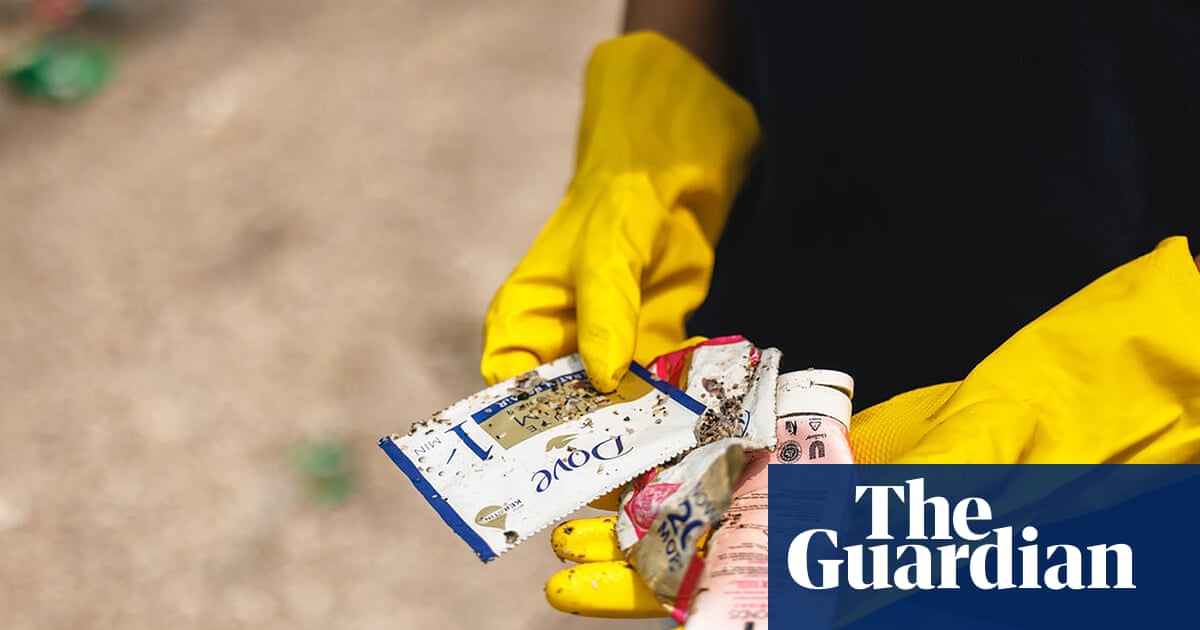
Unilever is on track to sell 53bn non-reusable sachets containing anything from sauces to shampoo in 2023, breaking its commitment to switch away from single-use plastic, a report from Greenpeace has found.
The global consumer goods group has committed to reducing its plastic footprint and has said it wants to create a “waste-free world”. Under its former chief executive Paul Polman, who stepped down in 2019, Unilever positioned itself as a global leader on sustainability.
Four years ago, the company’s outgoing head of nutrition, Hanneke Faber, described the type of multilayer plastic found in sachets as “evil” because it could not be recycled.
However, research by the environment NGO Greenpeace has found that despite Unilever’s pledge to halve its use of virgin plastic by 2025, the company is on track to miss the target by nearly a decade.
Nina Schrank, the head of plastics at Greenpeace UK, said: “Unilever really are pouring fuel on the fire of the plastic pollution crisis. Their brands like Dove are famous for telling the world they’re forces for good. But they’re pumping out a staggering amount of plastic waste. It’s poisoning our planet. You can’t claim to be a ‘purposeful’ company whilst bearing responsibility for such huge pollution. Unilever has to change.”
The throwaway sachets of consumer products such as condiments, beauty and health products are marketed and sold in large quantities to the global south. Unilever says this is because “in several of our markets, plastic sachets allow low-income consumers an opportunity to buy small amounts of products – often ones that provide hygiene or nutrition benefits like shampoo, toothpaste and food – which they would otherwise not be able to afford”. The sachets, however, are also linked to pollution on land and in waterways, resulting in, for example, clogged drains, worsened flooding and threats to wildlife.
Sachets produced by the Unilever brand Dove have been found polluting beaches and other waterways in the Philippines and Indonesia. Dove produced an estimated 6.4bn sachets in 2022.
Greenpeace is urging Unilever to phase out single-use plastic in the next decade and begin by stopping the use of sachets. Greenpeace is also calling on Unilever to back a global plastics treaty the NGO says must include a legally binding target of cutting plastic production by at least 75% by 2040, based on a 2019 baseline, followed by a phase-down in the production.
Marian Ledesma, a campaigner at Greenpeace Philippines, said: “Each one of the many Dove sachets we found polluting beaches and waterways should be a badge of shame for Dove and Unilever. They can’t continue to flood countries like the Philippines with waste they know can be devastating … Each sachet represents the enormous health risks, environmental degradation, social injustices and climate impacts caused by plastic production and the plastic life cycle.
“If Unilever want to be seen as a leader, they should stop being part of the problem. They have to show they’re serious and commit to phasing out single-use plastic, starting with sachets. And as treaty talks continue they must turn their influence on the world stage towards helping push for this level of ambition to sit at the heart of a strong global plastics treaty.”
A Unilever spokesperson said that tackling plastic pollution is a top priority for the company which is still making progress across all its plastic goals. The company is a member of the Business Coalition for a Global Plastics Treaty, which is campaigning for an ambitious, legally binding UN plastic treaty. “In the past few years, we have rapidly increased our use of recycled plastic (PCR) in our global portfolio to 21%. The Ellen MacArthur Foundation recently called out Unilever as one of the businesses making the most progress to reduce its virgin plastic packaging footprint.
“We’re working on a range of solutions to reduce our use of plastic sachets, which are difficult to recycle, and replace them with alternatives. This is a complex technical challenge, with no quick fixes, and we are fully committed to working with industry partners and other stakeholders to develop viable, scalable alternatives that reduce plastic waste.”
